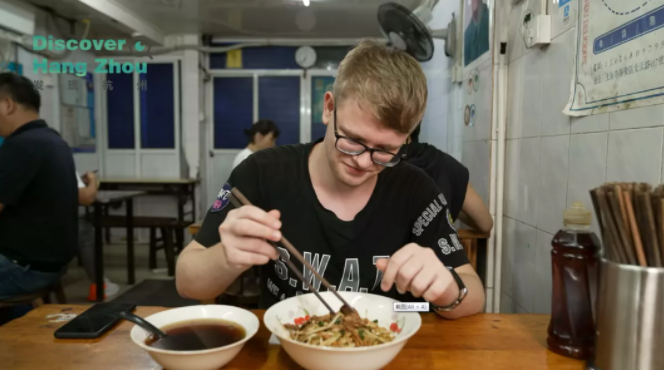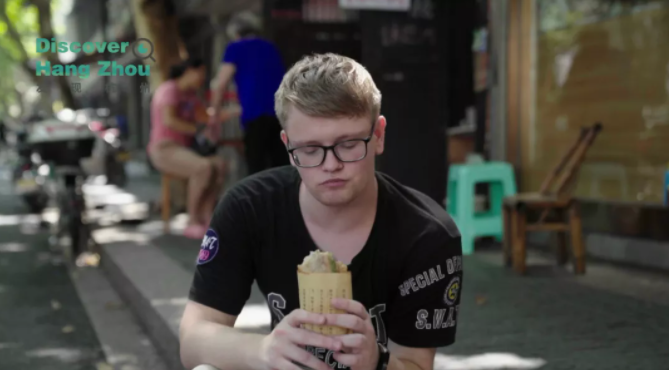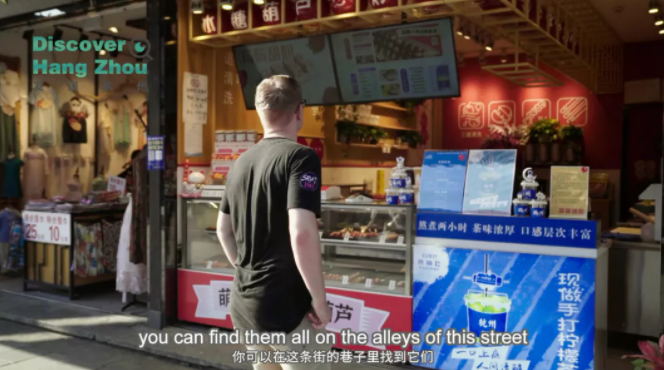Two years ago, Tupikov Mykyta, a Ukrainian student, came to Hangzhou to live together with his father who has been in Hangzhou for almost 10 years. Now, he is studying at Alibaba Business School of Hangzhou Normal University. While learning Chinese, the young man likes to wander around the old city of Hangzhou and look for the authentic local delicacies in Hangzhou.
"My friends in China told me that only the food that the locals also like to eat is the real traditional delicacy." It is not easy to find them because these local foods are hidden in the city, only relying on diners’ promotion from mouth to mouth. Apart from luck, Tupikov Mykyta also finds some common methods in China to find them. "To find these local delicacies, you can first check how long the restaurant has been open, and then see if there are some people queueing up before it, you can also get some clues via Chinese social apps." Centering on Hefang Street, Tupikov Mykyta has been spreading his own map about Hangzhou delicacies.

Mykyta finds out that Hangzhou cuisines are more than delicious, but also have their own cultures behind them.
For example, the snack called “Cong Bao Hui”, a traditional Hangzhou snack, combines fried dough sticks and scallions together with dough wrappers, and contains sweet or spicy sauces in it, and then gets itself fried and squeezed in an iron wok.
It is said that the origin of this snack goes back to the story of the Chinese national hero called Yue Fei, who was framed by an evil person named Qin Hui at the Feng Bo Pavilion.
Qin’s given name – "Hui" has the same pronunciation as the name of dough sticks in ancient China. This snack was invented by ancient Chinese people who wanted to use food to express their hatred towards treacherous persons by frying, squashing and eating them. And the tradition has now been passed on for almost 1,000 years.

In No. 5 DamaLane, Grandma Xu enthusiastically fetches Hangzhou Rolled Chicken for TupikovMykyta, one of his favorite foods. It is not a chicken roll actually but made of dried bamboo shoots wrapped in thin sheets of tofu, just similar to chicken roll in shape after being cut into sections. Dama Lane was already a lively market even over 900 years ago, and it still enjoys a sea of people till now.
Tupikov Mykyta sighs that the houses here are very old, the modern city is just a few hundred meters away, but the people living here are reluctant to leave. They are not poor, instead, they are relatively rich. Maybe they have an attachment to the inseparable lifestyle and nostalgic tastes here.

The "Discover Hangzhou" series of short videos, part of the Hangzhou Stories told by Foreigners Program jointly undertaken by the Office of Cyberspace Affairs Commission of Hangzhou and "In Zhejiang" have been launched on www.inzhejiang.com. The 8 episodes tell the fascinating stories of Hangzhou to the world.
Producer: Zhang Yuyi, Zhou Yi, Xue Yi
Video: Shu Lei, He Zhenzhen
Editor: Ye Ke